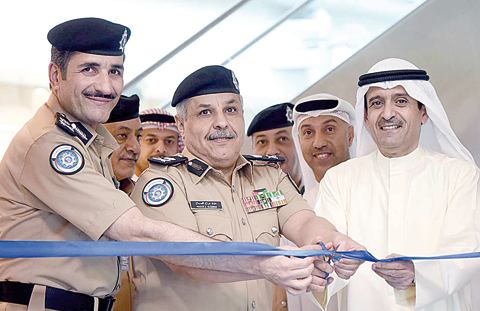Company received 5,000 requests to hire domestic helpers
 KUWAIT: Undersecretary for Citizenship and Passports Maj Gen Sheikh Mazen Al-Jarrah (center) inaugurates the new citizen services center at Al-Durra Labor Company. —Photos by Fouad Al-Shaikh
KUWAIT: Undersecretary for Citizenship and Passports Maj Gen Sheikh Mazen Al-Jarrah (center) inaugurates the new citizen services center at Al-Durra Labor Company. —Photos by Fouad Al-ShaikhKUWAIT: The Ministry of Interior (MoI) has no problem in lifting absconding reports upon sponsors' request, a senior ministry official said yesterday. Furthermore, the ministry is fine with the possibility of lifting the ban on domestic helpers from certain nationalities provided the foreign minister approves it, Assistant Undersecretary for Citizenship and Passports Maj Gen Sheikh Mazen Al-Jarrah said.
The official was speaking during a ceremony organized yesterday to launch the new citizen services center at Al-Durra Labor Company in Sharq. Responding to a question about transferring the domestic helpers' department from MoI to the Ministry of Social Affairs and Labor (MSAL), Sheikh Mazen stressed that both ministries are the same and that they always cooperate and coordinate the process of recruiting domestic helpers from abroad in a manner that reflects Kuwait's leading role.
The new center's opening ceremony was attended by residency affairs director Maj Gen Talal Maarafi, Al-Durra Chairman Eyad Al-Sumait and Al-Durra General Manager Saleh Al-Wehaib. Sheikh Mazen said the new center is an embodiment of ongoing cooperation between MoI and Al-Durra with the aim of providing the best quality services to citizens seeking the recruitment of domestic helpers. "We have more citizen service centers in Kuwait than restaurants," Sheikh Mazen quipped, noting that there are over 50 centers.
Meanwhile, Sumait said the company has so far received over 5,000 requests to hire domestic helpers of both genders and that 500 workers had been already provided. He added the company provides a six-month probation period for both helpers and sponsors, after which they decide whether to continue with their contracts or cancel them. He said it takes from 35 days to three months to recruit a domestic helper from other countries.
Govt employees increase
Recent statistics issued by the Civil Service Commission (CSC) showed that the total number of public sector employees is 349,691, an increase of 10,751 employees compared to the first quarter of 2017, when there were 338,940 employees. The statistics also explained that 42.33 percent, ie 148,009, were male employees, while 57.67 percent (201,682) were female employees. Moreover, statistics showed that 75.55 percent of the government's workforce (264,195) comprises of citizens, while GCC nationals number 4,563, other Arabs 49,337 and foreign expats 31,596.
Statistics showed that the majority of civilian employees worked for the Ministry of Education (MoE) with 113,875 employees, followed by the Ministry of Health (MoH) with 63,508, the Ministry of Electricity and Water (MEW) with 20,749 and the Ministry of Interior (MoI) with 20,536 employees. CSC statistics also explained that 5,437 of government employees are PhD holders, 11,441 master's degree holders, 160,446 are university degree holders, 54,502 hold diplomas, 65,860 hold school leaving certificates and 11,059 (including 3,328 citizens) are primary school dropouts.
KU parking
Well-informed sources at Kuwait University (KU) said that orders to construct and maintain a multi-storey parking complex at the Kaifan and Khaldiya campuses have been changed upon a request from the construction and maintenance department. The sources added that the change will affect 4.89 percent of the original contract value with a cost of KD 74,958. They added that the changes will be executed by the company that won the tender and that the contract's duration will thus be extended for six more months to be concluded in December instead of in June 2018.
Privatization law
Finance Minister Nayef Al-Hajraf said the government will refer the privatization law amendments to the parliament soon. Hajraf added that the national program for financial sustainability did not include taxing businesses and companies. He also stressed that one of the program's main aims is to preserve citizens' current living standards, giving an example of keeping fuel prices stable since Sept 2016 to be amongst the lowest in the GCC states and the world, which costs KD 1.623 billion in fuel and energy subsidies; ie 47 percent of the amount allocated for subsidies in the 2018-2019 fiscal year's budget.










